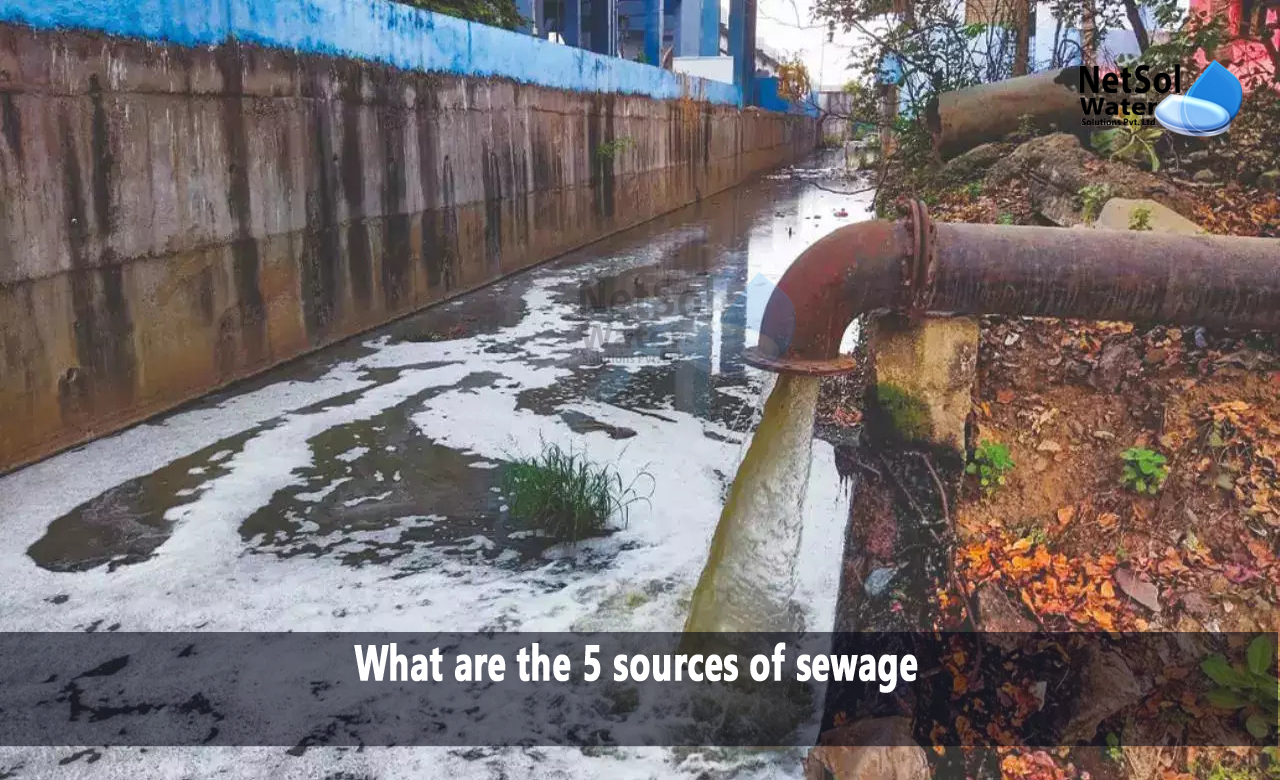What are the 5 sources of sewage?
Sewage, which is a ubiquitous component of contemporary life, is the result of collective human activity waste. To safeguard the environment and the public's health, a complex mixture of water, organic matter, chemicals, and toxins must be carefully managed. In this blog, we'll delve into the five main sewage sources and provide in-depth explanations of each as well as the significance of proper sewage disposal and treatment.
· Domestic Sewage
The most prevalent and easily recognisable source of sewage is likely domestic sewage. It includes the following elements and is derived from homes and residential areas:
a. Sanitary Sewage: Sanitary sewage is a byproduct of regular human activity inside of homes. It consists of the water that drains from bathrooms, kitchens, showers, bathtubs, and washing machines. Organic material, detergents, soaps, and personal care items are all present in this kind of sewage.
b. Stormwater Runoff: Stormwater runoff from rain events can contaminate sewage systems and add to domestic sewage. Stormwater can gather a variety of contaminants as it travels through metropolitan areas, including trash, oils, and chemicals, which further contaminate the sewage.
c. Greywater: Wastewater from plumbing fixtures other than toilets, such as sinks, showers, dishwashers, and washing machines, is referred to as greywater. Greywater still contains organic waste and common home pollutants even though it is less contaminated than blackwater (from toilets).
To stop waterborne infections, safeguard aquatic habitats, and guarantee wastewater treatment plants operate properly, managing home sewage is crucial.
· Industrial Sewage
Factory, manufacturing, and industrial processes all produce industrial sewage. Depending on the industry, its makeup varies greatly, but common elements include:
a.Chemicals: Various chemicals are frequently used and disposed of in industrial processes. If not appropriately managed, these substances—which may include solvents, heavy metals, acids, and hazardous compounds—may enter the sewage system.
b. Suspended Solids: A variety of industrial operations result in the production of solid waste, including plastics, paper pulp, metal shavings, and more. These heavy materials might enter the sewage system and provide difficulties for treatment facilities.
c. Hazardous products: If containment mechanisms fail, industries handling hazardous products, such petrochemicals or pharmaceuticals, may leak poisonous compounds into the sewage system.
Managing industrial sewage is critical to prevent environmental pollution and protect the health of workers and nearby communities.
· Commercial Sewage
Sewage generation from commercial facilities, such as hotels, restaurants, and enterprises, is substantial. Commercial sewage includes substances like:
a. Food Waste: Sewage from restaurants and other food-related businesses contains grease, oils, and food scraps. These compounds can cause odours and obstructions in the sewage system, making treatment difficult.
b. Chemicals: A number of industrial facilities, including dry cleaners and auto repair shops, are prone to dumping chemicals and solvents into the sewage system. Both the environment and general public health may be harmed by these pollutants.
c. Human Waste: Commercial establishments have restrooms that add to the overall sewage load, similar to how domestic establishments do.
Managing commercial sewage is essential to prevent blockages in the sewage system, control odors, and ensure that harmful chemicals do not contaminate water resources.
· Agricultural Sewage
Agricultural runoff is the main kind of sewage produced by agricultural activities. In rural locations, this sort of sewage is very significant and may consist of:
a. Animal Waste: Large amounts of sewage in the form of manure are produced by farms with livestock. Manure management issues can result in runoff that pollutes surrounding water sources by introducing germs and nutrients.
b. Pesticides and Fertilisers: Using pesticides and fertilisers in farming might result in the chemicals being washed into neighbouring rivers. This discharge damages aquatic ecosystems and adds to water pollution.
c. Soil Erosion: Runoff from agricultural fields may contain silt as a result of soil erosion. This debris can impair water quality, damage aquatic habitats, and jam up waterways.
· Municipal Sewage
Municipal sewage is the wastewater produced by public buildings and institutions, such as schools, hospitals, and offices of the government. Typically, it includes sewage from commercial, industrial, and home sources. Additionally, transportable sources like recreational vehicles (RVs) and boats may discharge sewage into urban sewage systems.
To protect the general public's health, preserve the efficiency of the treatment facilities, and stop the release of toxins into natural water bodies, comprehensive sewage management is essential in municipal systems.
Conclusion
The complicated mixture that is sewage is the result of several human activities. Effective sewage management and environmental protection depend on an understanding of the various sources of sewage. In order to avoid water contamination, protect the public's health, and guarantee the sustainability of our ecosystems, proper sewage disposal and treatment are essential.
By lowering our environmental impact, adopting eco-friendly habits, and supporting wastewater treatment facilities, we as individuals and communities play a critical part in managing sewage responsibly. We can all benefit from cleaner water, healthier environments, and a sustainable future if we band together to address the problems caused by sewage.
Netsol Water is Greater Noida-based leading water & wastewater treatment plant manufacturer. We are industry's most demanding company based on client review and work quality. We are known as best commercial RO plant manufacturers, industrial RO plant manufacturer, sewage treatment plant manufacturer, Water Softener Plant Manufacturers and effluent treatment plant manufacturers. Apart from this 24x7 customer support is our USP. Call on +91-9650608473, or write us at enquiry@netsolwater.com for any support, inquiry or product-purchase related query.



